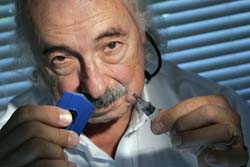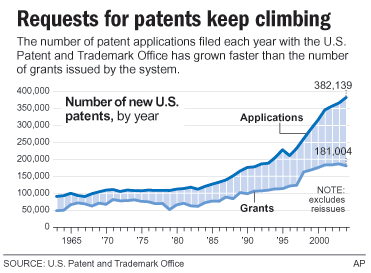Small-time inventors take on Congress, high-tech industry over proposed patent law changes
By Erica Werner / Associated Press
Oct. 22, 2005
 Chris Carlson / Associated Press
Chris Carlson / Associated Press
Inventor George Margolin of Newport Beach, Calif., holds one of his inventions, a portable syringe designed to guard against unwanted needle pricks. Margolin fears his ability to create inventions is threatened by legislation he says would yank patent protections away from the little guys in favor of big corporations like Microsoft.
WASHINGTON -- In the world of small-time inventors, George Margolin, 75, of Newport Beach, Calif., is a resounding success. He has patented a syringe that prevents unwanted needle-pricks, a folding keyboard that was licensed by Hewlett Packard and 25 other devices from the practical to the arcane.
Now Margolin fears his ability to create is threatened by legislation he says would yank patent protections from little guys like him in favor of big corporations like Microsoft.
"The Wright Brothers -- two slobs in Dayton, Ohio, who became the airline industry -- Edison with his multitude of inventions, they would have all been stifled and stopped by this kind of legislation," said Margolin, who now makes a comfortable living from his inventions after years when he had to support himself through bartending and other jobs. "It would be absolutely destructive."
The Patent Reform Act of 2005, sponsored by Reps. Lamar Smith, R-Texas, and Howard Berman, D-Calif., includes changes supporters say are needed in a system that's processing more and more patents.
Among other things, the bill seeks to cut down on nuisance lawsuits by "patent trolls" -- people who take out patents on products, methods or ideas just so they can sue a company for infringement if it eventually produces something similar.
Such lawsuits have bedeviled the high-tech industry, in part because computer technology can involve hundreds or thousands of individual patents per product. The Information Technology Industry Council says patent lawsuits in federal court doubled from 1,200 to 2,400 annually from 1998 to 2001.
The bill would make it easier for patent-holders to fight such lawsuits in potentially friendly legal venues, such as in the judicial district where they are headquartered.
Last year, 380,000 patent applications were filed at the U.S. Patent and Trademark Office, compared with 200,000 in 1994. The office says it has a growing backlog of 600,000 applications and a shortage of patent examiners.
"I do believe that there's a patent quality problem," Berman said, citing reports by the National Academy of Sciences and the Federal Trade Commission that reached that conclusion. "A lot of people who don't have an ax to grind think there needs to be reform."
Critics cite examples of seemingly absurd patents, such as U.S. Patent No. 5,443,036, issued for a method of using a laser pointer "in an irregular way fascinating to cats" so the animal gets aerobic exercise.
To try to ensure that patents are issued for truly innovative and novel devices, the bill includes provisions allowing patents to be challenged for nine months after they're issued, and allowing third parties to present evidence to the patent office related to pending patent applications.
Current U.S. law says a patent goes to the person who can show they first invented a device; the pending legislation would give the patent to the person who filed for it first, the method used internationally.
But Margolin and his group, the Professional Inventors Alliance, say the changes would allow big companies to endlessly contest legitimate patents and patent applications. They say the bill would protect corporations with the means to rush to file their applications first over small inventors who actually come up with the idea, and make it unreasonably difficult for individual patent-holders to pursue legitimate lawsuits against companies that steal their inventions.
"I honestly feel that if we don't stop what the big companies are trying to do, there won't be any opportunity for us," said Ronald J. Riley, the Professional Inventors Alliance's president. "What they call patent reform is all about making it virtually impossible to enforce the patents."
Backers of some of the changes say the concerns are overblown.
"In no way do we want to limit entrepreneurs' ability to start businesses and innovators' ability to innovate. If you look at some of our big companies, they started in the garage and we understand that," said Josh Ackil, the Information Technology Industry Council's vice president of government relations. "The issue we're trying to address is the patent trolls who claim they're entrepreneurs by grubbing up patents."
Riley calls the patent troll label a "clever slur" that high-tech companies uses to tar small-time inventors who get in their way, insisting most inventors are legitimate businessmen who simply want to be able to protect their intellectual property.
The most recent version of the legislation was the result of negotiations among the high-tech industry, pharmaceutical companies and others, though disagreements remain and a final bill has yet to be filed. The House Judiciary Committee's intellectual property subcommittee, led by Smith and Berman, has held several hearings, and Sen. Orrin Hatch, R-Utah, who chairs the Senate's intellectual property panel, also is working on a bill.
The Professional Inventors Alliance has the budget to hire only a single lobbyist at a discounted rate, and members complain their concerns have been largely neglected. They hope that will change before a bill is voted on. Otherwise, the inventors say, the proposed changes could spell disaster for the kind of people responsible for breakthrough inventions like the phonograph, the airplane and the computer.
"Small inventors are the ones that make big businesses," Margolin said. "If we don't invent and create new stuff, what are we going to be?"
On the Net:
U.S. Patent and Trademark Office: http://www.uspto.gov/
Professional Inventors Alliance: http://www.piausa.org/
Margolin Development: http://www.margolin-development.com/
